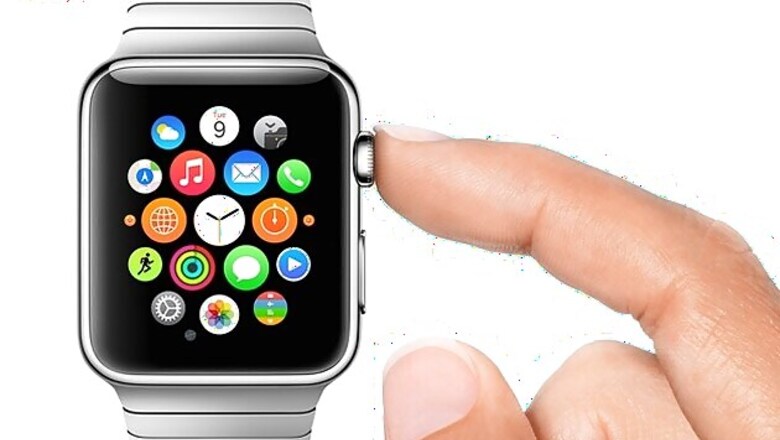
views
San Francisco: Apple's hotly-anticipated smartwatch is expected to debut Monday as the trend-setting firm sets out to make stylish wrist-worn computers must-have accessories for modern lifestyles.
Industry trackers say Apple Watch will star at a media event being held at the same San Francisco theater where the California tech giant introduced the iPad.
Apple's chief executive Tim Cook has revealed little about the sophisticated wrist wear, but has said that he "can't live without it."
The company announced its plans for Apple Watch last year to much fanfare and has said it would begin shipping in April.
It will mark Apple's first new product type since the iPad in 2010.
Apple has indicated that the entry price would be $349 in the United States, and that two different sizes would be available in three collections, including the "Apple Watch Edition," featuring 18-karat gold cases in yellow or rose, sapphire crystal and finely crafted bands and closures.
The Apple device will connect with the iPhone, and also have a range of apps and sensors, notably for health and fitness.
The watch is also expected to include map software that guides people to destinations with gentle "taps" on the wrist.
Fitness apps on the Apple Watch and its rivals could spell trouble for makers of fitness bands from companies like Jawbone, Fitbit and Nike.
"Apple is poised to once again show how computing platforms are won or lost on the one-two punch of eager consumers and hungry ecosystem partners," said Forrester Research analyst James McQuivey.
Apple reportedly had to scale back health tracking features on the watch after some sensors didn't rise to the challenges.
Catalyze, dominate the market
It remains unclear whether Apple -- a latecomer to the wearables segment -- would do for smartwatches what the iPod did for MP3 players and the iPad did for tablet computers.
Apple enters a segment crowded with vendors ranging from South Korean giants Samsung and LG, to Japan's Sony and startups such as Pebble.
Motorola, acquired by Chinese giant Lenovo last year, also produces a smartwatch, and China's Huawei introduced its version at the Mobile World Congress in Barcelona this month.
Pebble, which burst on the scene with a crowd-funded smartwatch in 2012, this month broke the record on the Kickstarter platform with more than $16 million raised.
Research firm Strategy Analytics predicts Apple will set fire to the market from the outset, projecting sales of 15.4 million units worldwide in 2015, to give Apple a 55 per cent market share.
"The Apple Watch is the catalyst to ignite the global smartwatch market," said Strategy Analytics executive director Neil Mawston.
"Apple's famous brand, loyal fan base, deep retail presence and extensive apps ecosystem will ensure healthy uptake for its watch."
Still, he said Apple may see a few glitches that need to be ironed out.
"Apple's first-generation Watch is not yet perfect," Mawston said in a statement.
"Apple will need to upgrade tangibly its second-generation watch to stay ahead of competitors later this year."
He noted that rival models are more attractive, have a longer battery life and offer more affordable prices.
But Deutsche Bank analyst Sherri Scribner predicted an even bigger splash for the Apple Watch, with sales of 17.6 million units this year.
By 2018, Scribner said, one of every four iPhone users will also have an Apple Watch, making the segment worth some $26 billion for the company.
In a research note, Scribner said the Apple Watch should be a "catalyst" to expand the market, with wrist-worn devices gradually becoming a complement to smartphones.
The next big thing?
Others say it's not yet clear if the smartwatch will become the must-have accessory for consumers, particularly if the pricing remains at current levels.
Roger Kay, analyst at Endpoint Technologies Associates, said Apple's loyal consumer base will deliver a certain number of sales but won't guarantee widespread adoption.
"There will be 10 million people who will buy it because it's from Apple," Kay said. "But the larger question is whether this category really has legs."
A key question is whether Apple can create the same kind of buzz and energy around a new product without its legendary leader Steve Jobs, who died in 2011.
"Steve could distort reality and tell everyone it was the next big thing, and people would believe it," said Kay.
"They've never done it without Steve. So this is the challenge for Tim Cook."




















Comments
0 comment